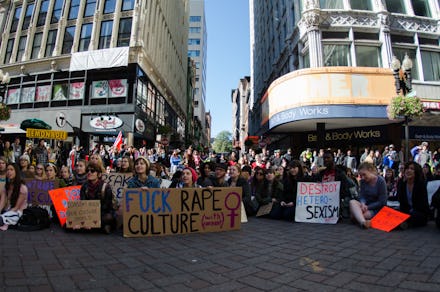Students Can't Fix College Sexual Assault Alone

Last Friday, Al Jazeera's America Tonight added to the burgeoning national dialogue on campus sexual assault with a "Sex Crimes Town Hall."
The 90-minute program, filmed at the Newseum, explored the actions campus officials are taking to eradicate rape on college campuses, and how federal and individual university policies have impacted the process.
Although sexual assault on campus isn't a new phenomena, the national discussion on sexual violence at-large does seem to be at a peak; Friday's America Tonight made it clear that the movement to end rape and sexual assault has come into public passion. The televised special also marked the next stage in that movement's progress: holding public figures and communities responsible for implementing a solution.
As a former campus activist and hellraiser, I know that students are an integral piece of the movement to end sexual violence on campuses around the nation and the world. In my four years as an undergraduate, I was able to speak out without fear of reprise, and could articulate more radical theories and ideas than those which would have been acceptable from my administrative allies, and I was often asked in private conversations to do so.
My job was to make demands — such as asking for a victim advocate, mandatory prevention education, and a Women's Center — that needed to be made, and thrust them into public discourse until they felt real. Sometimes, that was what it took: it was easier to push radical change through the system by creating public momentum, rather than working inside a bureaucracy for months simply to get permission to act.
I trust students with this movement, and trust them uniquely to put pressure on administrators and faculties to end rape on their campuses. But though I took on the issue of rape culture head-first and spoke as loudly as I could during my tenure as a student leader, I was saddened to find that the fight drastically changed course once I left. Although the feminist ideals of ending sexual violence remain present in my campus community, the shift in leadership for my campus women's group led to an abrupt halt of energy and focus on the issue. Goals were lost, put aside, and sacrificed.
Even the most impassioned student activism often cannot succeed at changing policies and practices on a college campus when undertaken in isolation. (I've written about this phenomena before, but it's worth repeating.) Student activism isn't entirely sustainable; administrators take note of the natural ebb and flow of student leaders from year to year and can use it to push back and destroy opportunities for long-lasting change. Students can uniquely conceptualize of and work toward building a rape-free campus, but they cannot be held solely responsible for implementing and maintaining the new culture that they envision. Administrators, faculty, and staff members must also commit themselves to this fight in order to foster its progress.
Since graduating, I've gone on to tackle the issue of sexual violence on a larger scale in the "real world"; that means that now, instead of focusing on eradicating sexual violence on my campus, I am now focused on campuses across the nation. I work with leaders from diverse backgrounds, communities, value systems, and legal jurisdictions — and their activism looks like mine. They are marching, making noise, and articulating demands (all of which sound awfully familiar to my own). What resonates with me is that those steps toward a rape-free world are better together, and impossible alone.
America Tonight shed light on that discovery, perhaps inadvertently, when they praised successful administrators and officials who were tackling sexual violence. In many cases, those actions are heavily influenced by students who sit on advisory boards or garner support for this cause, as was the case when the University of Maryland recently made mandatory an educational program put together by students and staff engaged in this issue. Administrative cooperation is the missing piece to solving this epidemic — and the slew of Title IX lawsuits holding university administrations accountable for failing to take said-Howepidemic seriously are proof enough.
The national dialogue we're holding on campus assault has led, thus far, to a huge shift in how the media and the lawmakers in this nation tend to this issue and those it has affected. We've seen legislators and the president alike taking action to put new overhead policies in place to hold colleges accountable for eliminating sexual violence from their communities, and we've seen students rising up to take action around this issue through social, legal, and political means. But all this work is only the beginning for current and former activists like me.